
FRIDAY-SUNDAY, JULY 4-6


FRIDAY, JULY 18 Temple Solel Shabbat at Beach


MON., SEPT. 29-THURS., OCT. 9


LETTER FROM JERUSALEM
Few parallels between U.S. operations in Afghanistan, Iraq and Israel-Palestine
By Ira Sharkansky
 JERUSALEM—Things are not going well for the United States in Afghanistan. The Washington Post headlines an increase in US deaths. Somewhere down in the article, we read that a ranking American official says, " . . . There has to be better governance, less corruption, more economic development and more vigilance paid to counternarcotics in order to ultimately bring peace and stability to Afghanistan." JERUSALEM—Things are not going well for the United States in Afghanistan. The Washington Post headlines an increase in US deaths. Somewhere down in the article, we read that a ranking American official says, " . . . There has to be better governance, less corruption, more economic development and more vigilance paid to counternarcotics in order to ultimately bring peace and stability to Afghanistan."
That is spoken by someone who did not ask advice from the British or Russians, both of whom blunted their swords without much effect in Afghanistan.
I do not claim great expertise on Afghanistan. I spent a limited time there years ago, and have followed things from a distance. I think that I know enough to distrust experts who claim to know what is happening where, and how a foreign force ought to invest its efforts. I have seen the emblems on a cliff face in the Khyber Pass of all those British units that failed in the 19th century. Frustrated Russians left the place, having done little more than killing a lot of their own soldiers, perhaps more Afghans, and contributing to the destruction of the USSR.
Were I making US policy, I would have left Afghanistan after giving a massive post 9-11 blow to the Taliban. Whoever ran parts of the country would then know the cost of tangling with America. I would not have invaded Iraq. Never would I aspire to reform either country.
For those who think about Israel's efforts with the Palestinians as a model for how the Americans should operate in Muslim areas, I have bad news.
Palestine is much smaller in size and population than anything faced by the US. There may be 3 million Palestinians in Gaza and the West Bank, which together are smaller in size than many American metropolitan areas.
Israel has been dealing with Palestinians for its entire modern history. High schools and junior high schools teach Arabic. It is second to English as a foreign language. High school graduates who are close to fluent, or fluent, spend their military service in intelligence. Some stay for a career in the army or another of the security services.
The IDF takes youngsters right out of high school, and makes some of them officers. Later it invests heavily in education for those who stay on.
Last year I supervised the masters theses of five colonels in the National Defense College. They wrote their theses in about three months, compared to one to three years that civilian students allocate to the task. All of them were acceptable, within standards that I have learned over the course of 40 years. Two of them merited translation and publication in international journals. I offered to help, but the students who wrote them were assigned to functions that would demand all of their time.
The security forces also invest heavily in Palestinian sources of information, not in ways they wish to reveal. There are unmanned aircraft and balloons with cameras in the air much of the time. The result is that the army knows which car to destroy from the air, and which house to enter in order to take away more of the bad people.
Aspirations are no greater than to achieve a few years of relative quiet. Under pressure from the Bush administration, some politicians speak of making peace with a Palestine on the road to democracy. Few Israelis buy that line.
We know that concerted efforts against organized violence will lead enraged individuals to take a kitchen knife, or a bulldozer, and seek to kill Jews. I begin to cry whenever I read about the mother killed in the latest incident, who threw her baby out of the car just before it was crushed. The baby is all right.
American optimists see hope for their efforts in Iraq. I do not claim to be a prophet, but I expect that American troops will remain there and in Afghanistan for as long as they will be in Germany, Japan, and Korea. It is not easy being a world empire, with responsibility for everything.



THE POLITICAL GROTTO
What does the state budget proposal
say about California's moral compass?
By Gary Rotto
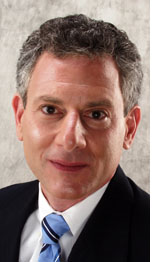 SAN DIEGO—The new fiscal year has begun and we are without a State Budget. This seems like an annual rite of passage for our state and is often greeted with a great yawn. SAN DIEGO—The new fiscal year has begun and we are without a State Budget. This seems like an annual rite of passage for our state and is often greeted with a great yawn.
But this year is different. The state is experiencing its largest budget deficit ever. According to the non-partisan Legislative Analyst Office (LAO) in Sacramento, the amount is $15 billion – after $7 billion in solutions that the Legislature adopted in a special session earlier in the year.
“The budget is the message,” stated Rabbi Laurie Coskey, executive director of the Interfaith Coalition for Worker Justice (ICWJ). I stopped by to her office to get more information about “A Moral Budget for All Californians,” a document published by Clergy and Laity United for Economic Justice (CLUE) and supported by the ICWJ. The organization is appealing to communities of faith to call for a moral state budget, one based on the principles of reason, compassion, fairness, responsible investment and stewardship.
The basic problem with the budget is that revenues are down. According to the LAO, “The state’s sluggish economy has reduced the revenue outlook for 2008-09 by about $6 billion.” One can debate the size of expenditures, but it is very clear that revenue’s have gone down.
Judaism has always emphasized the priority of caring for all members of the community – particularly the most at risk, the most vulnerable, states Rabbi Coskey. “The Torah, the Prophets and the Talmud are filled with directives to care for those who live amongst us.”
So if the budget is the message, what does the Governor’s revised budget, the starting point from which the Legislature begins its debate on the budget, say about our society?
Assuming the necessary two-thirds majority of the Legislature agrees with Governor Arnold Schwarzenegger’s proposals, it say that education will experience some cuts but not nearly what was originally proposed in January. The requirements for funding education will meet the requirements of Proposition 98 adopted by the voters several years ago. Since K-12 education comprises 37 percent of the budget and higher education comprises another 10%, this means that the additional cuts have to come from what remains. Park closures were taken off the table by the Governor and transportation comprises less than 2 percent of the State’s General Fund. So health and human services take the big hits.
What is also striking is that funding for prisons continues to grow, doubling as a percentage of the General Fund from 5% in 2002 to 10% this year. So while vital services in our community are cut, we throw more money at our prison system.
So what is the message that our budget tells? What is the value system that our budget is based on? Continue to warehouse people, continue to prosecute and cut back on services that would keep people out of prison.
“As Jews, it is our responsibility to hold our elected officials responsible to caring for all people living, working and participating in the social structure of California,” says Rabbi Coskey. One must conclude that measured against these principles – this budget fails our society.


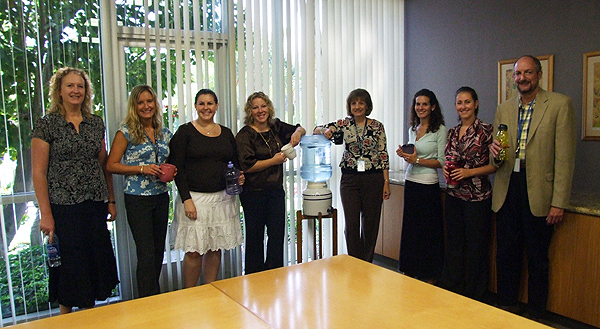
.
THE JEWISH CITIZEN
How do you spell tikkun olam? G-R-E-E-N
By Donald H. Harrison
 SAN DIEGO—The United Jewish Federation is becoming increasingly “green,” both in the efforts of its office staff to preserve the earth’s resources and through the activities of UJF’s Young Adult Division (YAD). In that UJF shares a building with the Agency for Jewish Education, the Jewish Community Foundation and the Alzheimer’s Association, earth-friendly practices are spreading. Other agencies, including Jewish Family Service, are drawing up their own plans. Some synagogues such as Congregation Beth Am have programs well underway. SAN DIEGO—The United Jewish Federation is becoming increasingly “green,” both in the efforts of its office staff to preserve the earth’s resources and through the activities of UJF’s Young Adult Division (YAD). In that UJF shares a building with the Agency for Jewish Education, the Jewish Community Foundation and the Alzheimer’s Association, earth-friendly practices are spreading. Other agencies, including Jewish Family Service, are drawing up their own plans. Some synagogues such as Congregation Beth Am have programs well underway.
Key players in UJF’s efforts are Dana Levin, a campaign associate who brought back some ideas from a recent Green Zionist Alliance meeting in Los Angeles, and Brett Robbins, chair of the 70-member “green cluster” for the Young Adults Division, whose members are in numerous professions and potentially can spread environmental friendliness to their workplaces.
After returning from the Los Angeles conference, which she had attended on her own volition, Levin made an appointment with Michael Rassler, UJF’s chief executive officer, and Michael Sonduck, chief operating officer, to lay out various steps UJF might take in pursuit of the ideal of tikkun olam— repairing the world.
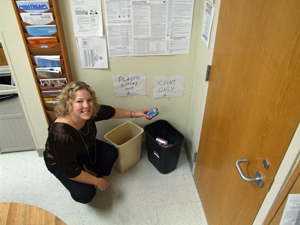 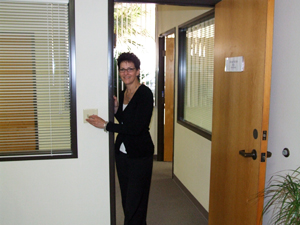
Among those suggestions that were implemented, said Levin, was “eliminating all the plastic water bottles. We were purchasing them through our water guy along with the five-gallon big ones. They were getting dropped in the trash and it was a waste of money and resources … People would take a sip and the remainder of the water would be thrown away.”
Levin, who was a member of the Wisconsin Environmental Jewish Initiative (WEJI) during her student days through 2003 at the University of Wisconsin, said that following the elimination of the individual water bottles, “staff members use their reusable mugs, cups, and bottles.” Don’t they have to use a lot of water to wash them out? I asked. “Most people wash them at home in their dishwasher with everything else they are washing.” She said another good environmental practice is not to run the dishwasher until it is full.
There are places around the UJF offices—particularly in the snack room—for the recycling of cans and bottles, Levin said, and there is a determined effort to get people to turn off their office lights and electrical appliances when they plan to be away from their office for a few hours. “Staff people are asked to turn off heaters and computers, not just simply put them into sleep mode. If their offices have their own light switches, we urge them to turn them off if they are leaving for a few hours.”
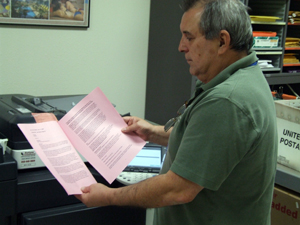 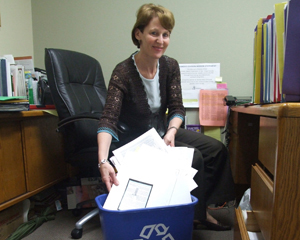
.
United Jewish Federation produces numerous reports, so particular attention is paid to the use of paper products. “There is a much greater effort to not be wasteful with paper,” Levin said. For example, everyone is asked to double-side their copies, and each individual person in a cubicle has his or her own recycling container.”
These steps were fairly easy to implement, Levin said.
Asked about reducing energy costs for people commuting to the office, perhaps through the implementation of carpooling, transit credits, or through more flexible office hours, Levin responded that this is an issue that requires more thorough study.
Another idea worth discussing, said Levin, is having various Jewish organizations pool their resources to purchase biodegradable cleaning products. In small quantities these products tend to be more expensive than other products, but purchased in volume, there could be savings
*
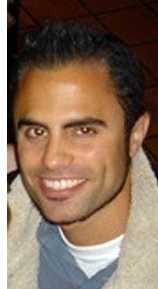 Robbins, a real estate agent (pictured at right) , majored in Major Resource Ecology at the University of Vermont, a field he described as the “study of plants and animals and how they interact.” Following graduation, he entered the field of environmental consulting in Boston, but left his employer “after they denied my recycling program. I was the greenest person there.” Robbins, a real estate agent (pictured at right) , majored in Major Resource Ecology at the University of Vermont, a field he described as the “study of plants and animals and how they interact.” Following graduation, he entered the field of environmental consulting in Boston, but left his employer “after they denied my recycling program. I was the greenest person there.”
In San Diego, Robbins lives an environmentally friendly life, His residence is in the downtown area close to a transit line so that he doesn't have to own a car. “I work out of my house,” he said, and when he needs to go elsewhere, he utilizes the train, bus, trolley or a combination of these.
“One of my goals in real estate is to fix up properties with green improvements, using recycled materials, energy efficiency, solar panels—it is important,” he said.
The Young Adult Division’s Green Cluster has sponsored such events as a “beach cleanup and a kayak demonstration,” Robbins said. I asked if kayaking was considered environmentally friendly because it didn’t require motor power. “Well,” he responded, “we just thought it might attract more people to the beach cleanup, which was in Coronado.”
Another activity was a visit to the Eco-Center in San Diego, where one can inspect a fueling station for propane or natural gas-powered automobiles.
“We also have done some eco-friendly dining such as at the Hotel Solamar in downtown San Diego,” Robbins said. “Their practices are ecologically friendly: they have energy conservation, water conservation, and their Jsix restaurant serves local, organic foods and drinks. Local foods you don’t have to transport, and organic foods limit the number of chemicals that come into the environment, so the combination of local, organic foods is the best…”
Robbins said bringing his “passion and experience” to the green cluster merges his two great loves of “environmentalism and Judaism.”


ARTS IN REVIEW
Klezmer with knishes, juice and 'p'stromi'
By Carol Davis
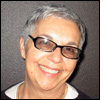 SAN DIEGO—I’ve never been much of a fan of the knish. Frankly I’d rather a blintz, but that wasn’t on the menu at the 8th Annual Klezmer Summit. By the line of takers, (compliments of Schmoozers) however at Monday night's show, clearly I am in the minority. Be that as it may, there was no denying the fact that as Todd Salovey, Festival Artistic Director for the past fifteen years, told me in a recent interview, “The Klezmer Summit is the most popular event of the Festival.” So this year we had Klezmer with Knishes, Juice and Pastrami. Don’t get excited, we could only eat the knishes, but we figuratively devoured the Juice and Pastrami! SAN DIEGO—I’ve never been much of a fan of the knish. Frankly I’d rather a blintz, but that wasn’t on the menu at the 8th Annual Klezmer Summit. By the line of takers, (compliments of Schmoozers) however at Monday night's show, clearly I am in the minority. Be that as it may, there was no denying the fact that as Todd Salovey, Festival Artistic Director for the past fifteen years, told me in a recent interview, “The Klezmer Summit is the most popular event of the Festival.” So this year we had Klezmer with Knishes, Juice and Pastrami. Don’t get excited, we could only eat the knishes, but we figuratively devoured the Juice and Pastrami!
This years Summit boasted two very gifted bands; “Klezmer Juice”starring Gustavo Bulgach and his talented group of four who poured their hearts out with their program Una Noche Yiddishe and Yale Strom’s Hot P’Stromi, a group well established in the klezmer world and especially San Diego where Strom is a native son. Strom gave us insight into some of his newer sounds with his introduction piece.
Each so different, yet both products of the klezmer phenomenon. Bulgach is what is being referred to as the "new generation of Jewish Soul musicians. Torchbearers of an ancient traditional craft that unites generations in spirit, the average age of the members of his band is 30."
Strom, who has been having a love affair with klezmer music since 1981 (you do the math) has traveled extensively throughout the Eastern Block countries, an area including the Carpathian Mountains, where he photographed and recorded music and stories from approximately 1500 Jews left in that part of the world after the Holocaust. These stories were never told or heard before. According to Strom… “Most of the klezmer Bands at the time were using old music from 78 LP’s and other sources. He picked up that baton and never looked back.
Many years ago at early stages of the Jewish Art Festival I had the privilege and the pleasure of watching Strom perform. We had a chance, at that time, to see clips of him interviewing those who were still living in that mountainous area after the war. Since the early ‘90’s he has continued to travel extensively, make films, documentaries, write books and record his klezmer music. Currently, he is Artist-in-Residence in the Jewish Studies Program at San Diego State University and is an affiliate artist of the Center for Jewish Cultural Creativity.
While most associate klezmer music with the Eastern European sound, Bulgach is a product of Latin America, having been born and raised in Buenos Aires, Argentina. As part of the large Jewish community there he heard and learned this music as a young child from his family. His inspiration was in both the secular and religious segments of his Argentinean community. According to Bulgach, klezmer music is "the soundtrack of the Diaspora." Klezmer Juice was the house band for the Simon Wiesenthal Museum of Tolerance.
The thing that struck me at the Klezmer Summit was the diversity in the audience. Eavesdropping, but not understanding a word of at least three different languages, brought home the fact that popularity of this event is authentic. And while diversity in the cultural sense was obvious, the generational span ranged from old fogies like myself to young children sitting on their parents' laps.
Who wouldn’t be charmed by the young energetic Bulgach and his clarinet? It made brilliant sounds and spoke volumes. It took us places we’ve forgotten we had been. As my friend Robin whispered, she felt as if we were going to be welcomed to someone’s Bar Mitzvah party celebration while this intense young man played “Oseh Shalom” as a warm-up! Such talent! And watching Strom work his fiddle was a sight to admire and envy! I thought back to my grammar school days when I took violin lessons. OY! That I never really mastered it on no account diminished my love of and for it.
If someone asked me to sum up the evening I would have to use the word Heart to describe it. Each of these young men and their respective bands worked their collective derrieres off to entertain a captive audience who were willing to participate, clap, shout, sing along and be a part of a larger community. There were no holds barred and looking around the audience, the only expressions I saw on the faces in my vision were smiles. And, Oh! The tango dancers he brought into his act and played for were the shine radiating from Bulgash’s rising star, or the frosting on the cake, as they say.
I must say I was taken with the young Gustavo. His enthusiasm, yes charm and liveliness energized the evening from the start. I think he could have been on stage all evening instead of the 45 minutes allotted him and his band. So eager to please, he kept telling us ‘this is just a warm up, a rehearsal.' I believed him. With that energy, he was unstoppable. And he was having a ball playing to the audience.
Strom, on the other hand has a sound all of his own. It’s more disciplined and on this occasion, had a little less energy, but pure klezmer, nonetheless. He is the quintessential klezmer maven, composing much of his own Jewish music combining klezmer with Hasidic nigunim, Rom, jazz, classical, Balkan and Sephardic motifs. Both artists and their bands performed together at the end of the evening to the audience’s pleasure. No one wanted to go home.
The 15th annual Lipinsky Jewish Arts Festival is history now. Looking back on the month of June, I can say with conviction, this festival was a good one. It had variety, lots of music, (Seji Ozeri, Hershey Felder as both Gershwin and Beethoven at the Old Globe and Benny Friedman) the wonderful political storyteller and monologist, Josh Kornbluth, two promising new Jewish- themed plays, a haimish touch and widespread appeal. Hats off to Salovey and his busy staff who made it all happen.
Shalom until the 16th festival. Meanwhile I’ll see you at the theatre.


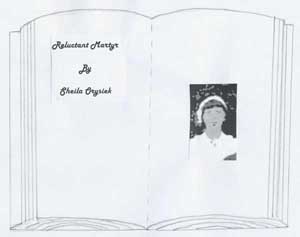 Editor's Note: This is the 15th chapter in our serialization of Reluctant Martyr, a historical novel by our columnist Sheila Orysiek. It is based on the experiences of her aunt. In each Friday-Saturday edition of San Diego Jewish World, we will run another installment of the 21-chapter book until its conclusion. We thank Sheila for granting us first publication rights to her book. Comments to the author are welcome at orysieks@sandiegojewishworld.com Editor's Note: This is the 15th chapter in our serialization of Reluctant Martyr, a historical novel by our columnist Sheila Orysiek. It is based on the experiences of her aunt. In each Friday-Saturday edition of San Diego Jewish World, we will run another installment of the 21-chapter book until its conclusion. We thank Sheila for granting us first publication rights to her book. Comments to the author are welcome at orysieks@sandiegojewishworld.com
Chapters 1 2 3 4 5 6 7 8 9 10 11 12 13 14 15 16 17 18 19 20 21
Reluctant Martyr—Chapter 15
When Hannah realized that her mother’s acquaintance with Istvan was becoming much more serious, she was very upset. She experienced a rush of jealousy and a sense of impending loss she couldn’t overcome. She refused to see that for the first time in many years, Sharona had the possibility of reaching out for some personal happiness. Hannah had intertwined her life so deeply with her mother that even Sharona felt it was wrong. This daughter’s love was a love that resented her mother’s quest for a home of her own. Hannah felt somewhere in her heart, that after working so hard to bring her mother to America, a debt was due to her, though she would have denied it had she been asked.
Etah felt differently. Certainly she loved her mother just as much, but perhaps being younger, she identified more with Sharona’s happiness. She was also busy seeking her own. The tall, lanky young man, who seemed to be around Etah so much of the time, had fallen in love with her. At first she didn’t really notice him, but eventually he found a place in her heart. His parents, too, were refugees from Russia and he had four sisters and a brother. They had all suffered grievously during the depression and he also had had to leave school to try and contribute to the survival of his family. He got a job parking cars at a downtown lot and his earnings were crucial to the family’s budget. For the rest of his life he sorrowed over his lost education.
Etah introduced Bernard to her family and he proved to be a bit awkward, but very likable. The circle around the Sabbath supper table had grown a bit larger. Bernard fully realized how important his salary was to his family, but he had fallen in love with Etah and wanted to get married. Typically he confronted the issue by allowing events to solve the problem. On his twenty first birthday he informed his parents of his decision and he and Etah set a wedding date for the middle of August.
The household on State Street was immediately faced with a number of financial problems. Etah’s contribution to the family’s expenses would be lost upon her marriage. Sharona wanted her daughter to be able to acquire some of the basic items necessary to set up a new home. A few things were given to her by Aunt Nora and others, but Sharona wanted her to have some brand new things, too. And, then, there was the cost of a wedding. Sharona, faced with all of this and the expense entailed, said “no” to Istvan and postponed her own wedding.
As it turned out Bernard had a large extended family and the tiny house on State Street was not adequate to hold the wedding. Bernard’s parents lived in a somewhat larger house, which was much more suitable. His parents agreed to have the wedding there and provide some of the food. Sharona provided even more food and a huge cherry strudel that took her two days to bake. On a warm evening in August the wedding was celebrated and the house overflowed with people. Hannah had on her pearls and Sharona had brought the Russian silver wine cups. For music, Bernard’s father hummed the Wedding March and they were married under a canopy as custom demanded.
That night when Jahn, Hannah and Sharona returned home, the house on State Street was a bit emptier and after all these years Sharona slept alone in the iron bedstead in the smaller bedroom. Hannah was overjoyed. Etah was all grown up and she thought she finally had her mother to herself. But, Sharona turned her attention to her own happiness and said “yes” to Istvan. They set another date for the end of October.
It was September and another wedding anniversary passed for Hannah and Jahn. With Etah now married and soon Sharona too, there was the possibility of having the house, their house, once again to themselves. Jahn was looking forward to it; Hannah was ambivalent. One evening after supper, when Sharona was upstairs, Hannah and Jahn sat in the parlor reading. Jahn put his book down and turned to Hannah. “In another month, Hannah,” he said, “just think it’ll only be the two of us again. That will be nice! I am looking forward to it.”
“Jahn! How can you say such a thing? My mother is an invalid and she needs me.”
“She is not an invalid. Besides, Istvan...”
“Istvan! What does he know? She needs me to take care of her, to be with her all the time. I am the only one who really and truly loves her, you know.”
“She has a right to some happiness of her own, Hannah.”
“She is happy with me,” Hannah said with great conviction.
“Well, you had better get used to the fact that she wants to get married. Can’t you be happy for her?”
“Why should I be happy? Because she is marrying a tailor?” They spoke no more on the subject as Sharona came down the steps.
“My eyes are burning,” Jahn said as he held his spectacles in one hand and rubbed his eyes. “I think I’ll go to bed early tonight, I’m very tired.”
The two women sat on the sofa and talked of Sharona’s coming wedding. “Mother are you sure about this? I mean you’ll always have a home here with us. And, now that Etah is gone, you’ll have that room to yourself. It will be so nice, you and me.”
“But I like Istvan and I’m looking forward to marrying him,” Sharona replied.
“Maybe it’s a mistake. You’ve never met his children. What do you know about his family? For all you know....”
“I like him, Hannah. He likes me. What else is there?”
“Think about how it looks to everyone - you get asked by the Chief Rabbi of Philadelphia and what happens? You end up marrying this nobody! What will everyone think?”
“He’s a nice man. That’s all I want.”
There was a sob in Hannah’s voice. “All my life you’ve been away from me and now....”
“Hannah, that’s not true. Surely you want me to be happy. I need a life of my own, too. Besides I’ll probably be living closely. Now let’s go to bed. I want to go downtown tomorrow and buy a couple of dresses for myself for the wedding.”
“Where did you get the money?” Hannah asked.
“Istvan gave it to me.”
....................................................
It was always fun to go to the huge department stores in the center of the city. Several of them took up an entire city block with floor after floor of wonderful choices. Sharona planned to buy some clothes and she ended up with three dresses; one for the wedding itself and the other two for a trip they hoped to take.
Later that day Etah and Bernard called to say they had rented a house on Cambridge Street next door to Mr. Guttmann’s shoe repair shop, less than two blocks from State Street. The newlyweds didn’t have many furnishings to put in it, but they were happy. Bernard had found a job with the Philadelphia Transportation Company; he was a conductor on a trolley. Etah still worked for Uncle Joseph and so their income was sufficient.
One evening Hannah and Sharona sat talking and admiring the three new dresses while Jahn was doing some bookkeeping. “Now this dress,” Sharona said as she laid it across the sofa, “I think I should wear it for the ceremony.” But Hannah was not enthused. She was looking for some way, any way, to keep her mother with her. “And this one,” Sharona continued, “I’ll wear on our trip.”
“How long will you be gone?” Hannah asked peevishly. Then looking at Jahn in the dining room, she said, “Jahn, what is wrong with you? You are making such a racket!” For some reason the pen kept slipping from his fingers, and he finally threw it down in disgust.
“Hannah,” Sharona called to her, “when do you think I should wear this dress?”
But Hannah had walked into the other room. “What’s wrong Jahn?” she asked as she put her arm around his shoulders. Then she leaned over and smiled at him. Her gaze fell on the columned work sheet on the table and was surprised to see his normally beautiful handwriting was reduced to a barely legible scrawl. “Jahn, what has happened here?” she asked pointing to the paper.
“My hands are in cold water all day; it is beginning to cripple them. I’m going to bed early; I’m getting a bad cold.” He rose from the chair and went slowly upstairs, his feet seeming to drag on each step.
The next day was Friday. Yarosh, Sofia, Etah and Bernard, and of course Istvan, all came over for supper. When they had gathered around the table it made quite a crowd. They waited for Jahn to come home from work so they could begin to eat. He walked in looking very tired and when he took off his hat they saw a bandage on his temple. Hannah rushed over. “What has happened? Your head, oh my G-d! You’re hurt!”
“It is nothing, nothing.” He tried to sound reassuring.
“How did it happen?” she asked, gently touching the bandage.
I got a little dizzy and took a wrong step on the ladder, that’s all. It’s nothing. Let’s eat.”
So supper began, everyone talking and eating. It was cold outside, but the house was warm. Yarosh’s little girl, Sinda, was a bright and beautiful child and her antics kept them laughing while her energy kept them alert.
“Well,” Yarosh said, “I have good news - wonderful news - my dear wife, Sofia, is expecting another child!”
“Congratulations!” Jahn exclaimed.
“And when,” asked Hannah, “is this one due?”
“February!” Yarosh said proudly. The silver cups from Russia were filled and emptied in toasting this oncoming life. After supper they continued to sit around the table, Sharona cuddling Sinda on her lap. Etah and Bernard were holding hands. Istvan’s heart sang with the warmth of this family and the woman who had agreed to marry him. After a while Jahn got up from the table.
Hannah looked up at him with worried eyes. “Where are you going? What’s wrong?”
“Nothing. I have a cold. All of the men at work have colds.” He coughed deeply several times.
“Let me give you something, more tea or an aspirin.”
“No, no. I’ll just go to bed. That will take care of it.” So he bade them all goodnight and went upstairs. By the next morning Jahn had a stiff neck and his back ached, but he tried to get up anyway.
“You certainly can’t go to work today.” Hannah declared as she pushed his head back down on the pillow.
“I have to...Joseph...” Jahn’s voice came rasping through his sore throat.
“I’ll call him up and tell him. No! You are staying home today.” Hannah saw to it that he stayed in bed all day, but by afternoon he had a very sore throat and could hardly speak. His temperature was climbing and Hannah called Dr. Rockman. It was Saturday evening when the doctor came and he ordered more bed rest, and told Hannah to keep Jahn warm and as comfortable as possible. There wasn’t much the doctor could do to alleviate the symptoms.
That night Jahn was feverish and restless. Hannah went to the bookcase and got one of his favorite books, “Best Loved Poems of the English Language” and pulling a chair up to the bedside, she read to him. She included some of his favorite poems and it seemed to calm him down.
In the middle of the night, Jahn got up and staggered down the hall to the bathroom and Hannah, who had fallen asleep on the chair, heard him violently throw up. When he opened the door, she was waiting to help him back to the bed and he gave her a wan smile. All the next day he stayed in bed. Sharona brought honeyed tea and fed it to him by the teaspoonful. Hot water bottles were brought and covers piled on as he shivered, and then just as suddenly he would perspire profusely. Dr. Rockman came again and said that perhaps the fever was breaking, but he looked a bit puzzled.
Jahn slept most of that day while Hannah sat on the chair by his side and seldom left him. Etah came over and offered to relieve her, but Hannah adamantly refused. As night came on his breathing became terribly labored. Etah didn’t go home, she slept on the sofa in case she was needed and Bernard slept on Jahn’s favorite stuffed chair in the parlor. Sharona, too, was in bed.
Hannah was still by his side on the chair when Jahn awakened and seemed a bit better. He indicated he wanted his spectacles and as Hannah gently put them on for him, he held her hand for a moment. She sat down again and picked up the book to read. He fell asleep to the sound of her voice. Eventually the book dropped to her lap, her eyes closed and her head slipped forward as sleep overtook her, too. The house was very still.
Toward dawn Hannah awoke with a start. She looked at her husband and seeing his eyes open behind the spectacles, she thought he was awake. “Jahn,” she said quietly, “did you sleep well?” She leaned over to brush away a strand of hair that had fallen across his forehead and saw the hazel eyes were blank. Jahn had died sometime during the night. The scream that rent the air was the scream of a lonely, terrified woman, a scream that echoed through all time; of denial, of horror, of love.
Bernard and Etah raced upstairs to the sound of those screams. For a moment they looked in disbelief. “Hannah! What’s wrong?” Etah shouted as she saw her sister wildly trying to embrace Jahn. When Bernard realized what had happened, he gathered Hannah up and as gently as he could, pulled her away. Her arms were flailing and her voice was growing hoarse. Etah turned in time to stop her mother from coming into the room.
“What’s happened?” Sharona yelled, trying to push Etah away. “What’s wrong? Oh my G-d! Tell me!”
“Mother,” Etah caught her and pulled her down the hall to the smaller room. “Come away! No! You can’t go in there!”
“Hannah!” Sharona screamed, “Hannah! What happened?”
Bernard and Etah got them both into the second bedroom. Etah went inside with her mother and sister and closed the door. “I’ll call Uncle Joseph,” Bernard told her as he ran down the stairs. “You stay here and don’t let anyone in that room.”
The house was bedlam when Joseph and Nora arrived. After assessing the situation, he called the doctor and the mortician on Girard Avenue. Hannah was kept in the small bedroom while the body was wrapped and carried down the narrow steps. In the confusion she managed to leave the room and ran to the front bedroom and saw the bed was empty.
“Jahn! NO! Where are you? Jahn? JAHN!!” She threw open the window in time to see them put Jahn’s body into the hearse and Etah caught her just before she would have thrown herself from the window. Hannah tore from her sister’s arms and ran over to the bed. The impression of Jahn’s head was still on the pillow. The poetry book was on the floor and as she bent to pick it up she saw his spectacles lying there, too. Lovingly she picked them up; there was a crack in one lens.
At the sight of the hearse the neighbors poured into the street and under cloudy skies they watched. Children craned their necks to see. Mothers held babies and men stood with arms folded. There was so much life on that street. And, if there is life there is also death and they had heard death in Hannah’s screams. For Hannah the only mercy that day was the consciousness that she lost when she fainted. The linens were hurriedly changed and she was put to bed; someone always at her side. She was never left alone.
..................................................
According to tradition, the funeral was arranged for the very next day. Friends, family and neighbors streamed through the house. They brought food, flowers and sympathy. Sharona took from a box a set of delicately tinted glass dinnerware she had just bought for her wedding and set it out so people might eat. During the funeral itself, Hannah fainted several times and at the sight of the plain pine coffin, which was also according to tradition, she was hysterical. And, in her cries anyone present who had ever been bereft of so close a love, felt the pain of that loss again.
The house on State Street became a place of palpable gloom. Mirrors were draped in black and completely covered over. Hannah tore all of her clothes except the ones that were black. Every day for eight days, ten men came to the house and said prayers, again according to tradition. Hannah took the pearls, the betrothal pearls Jahn had given her, the pearls he had purchased with his beloved violin and wrapped them carefully in cloth, and placed them in a small box. She gathered the pillow cases and tablecloths she had so eagerly embroidered with their initials and folded them carefully. Pearls, pillow cases, poetry book and spectacles were placed in a drawer of the desk in the parlor. And, in there too, carefully wrapped, she placed her gold wedding ring.
At first there was the shock of the loss of one so dear and then the expected aftermath of funeral arrangements. For the first few days friends and family filled the spaces in the house, but for the loved one left behind a special horror was reserved. Rooms had to be entered, closets and drawers opened and the places where Jahn had kept his things investigated and spilled out and eventually, however reluctantly, discarded.
There, over there, on that hanger hung the shirt he loved the most. And, here, the new shoes he had just bought. His book still had the marker in it to show the page he was on, and his slippers, worn and beloved, were under the chair. The testimony to daily life, a toothbrush, a towel, his shaving things - could they be simply put into the trash?
Hannah was not capable of doing it, she was choking on grief. Since it needed to be done, Etah, Sharona, and even Nora emptied the closets and drawers. His clothes were given to charity and his shoes were torn as custom demanded. Uncle Joseph went through Jahn’s papers and saw to it that outstanding money due to him was collected. He filed the death certificate, which stated the reason for demise as encephalitis that had probably been contracted through the bite of a mosquito or tick. A number of such cases had recently occurred on the East Coast of the United States.
Uncle Joseph also found in Jahn’s papers a life insurance policy. Through all of the rigors of the depression, Jahn had managed to keep it current so Hannah would not be penniless. The amount was not great and by the time the doctor, funeral and cemetery expenses had been met, Hannah would have almost one thousand dollars. Uncle Joseph began the process of collecting on the policy for her and meanwhile Istvan quietly paid the rent for that month.
Everyone thought that Hannah might not want to use the front bedroom again, but to her it was a sanctuary. She felt Jahn was still there, and it comforted her. Only slowly did life proceed, though it could never resume its old shape. The sun rose and set and thoughtlessly the world rushed onward.
Having postponed her wedding once, Sharona had set a new date for the end of October before these terrible events occurred and she did not intend to postpone it again. Her plans for it were different now. Hannah was stunned that her mother planned to carry on with her marriage to Istvan. As she walked by her mother’s room she saw her take the three new dresses out of the closet. She stood for a moment in the doorway and watched. “How can you flaunt your happiness in front of me like that? That’s all you can think of! My husband is dead and you are thinking of marriage and leaving me.” Fury killed her voice.
Sharona looked at her daughter in dismay and answered very quietly, “Hannah I’m not flaunting....”
“You sit here and ... in my house...and parade around! The only thing you can think of is your NEW CLOTHES! My world is gone. My Jahn is gone. Everything is over, but you have new clothes.”
“Hannah, please....”
“The man who fed you is gone barely a month and you don’t even care!” Hannah’s face was livid with rage. “I’m in black...but you’ll look nice! Is that all that matters to you?”
Sharona sat down on the edge of the bed, her hands limp in her lap and her eyes on the floor. She knew that it was her daughter’s terrible grief that was speaking. “Hannah, what do you want me to do?” she pleaded.
“I need you, mother! I want you here. You are all I have.”
“Hannah, I am not leaving. Istvan and I will live here with you. We are not going away, even on a trip. I was putting the dresses away in a box. I won’t wear them, I promise.”
“But you’re still going to get married aren’t you?” Hannah insisted, “Aren’t you?”
“Yes,” Sharona said very quietly. “I can’t help you. I can’t bring Jahn back. This is my only...” But Hannah had run down the hall and slammed shut the door to her room.
Sharona persisted. At the end of October in the tiny parlor, a rabbi and a canopy were in place and the blessings said and wine drunk in the presence of only the most immediate family. There was no music or gaily wrapped gifts, no big supper, and Sharona did not wear any of her new dresses. As Hannah looked around and saw each of the family members standing two by two, man and woman, her grief knew no bounds.
Sharona and Istvan had not looked for a place to live, they would not leave Hannah alone and so Istvan moved into the small back bedroom with Sharona. Hannah still occupied the larger front room all by herself and no one even considered a switch; certainly, she didn’t. Now Istvan and Sharona paid the rent and bought the food and Hannah was a guest in the house. It galled her, not only to be in this position, but especially to live off of the earnings of a tailor. She failed to appreciate his love for her family and care for her own well being. She was too concerned with her false image of his social status.
There was, of course, no wedding trip for Sharona and Istvan. Hannah spent her days sitting in the parlor, looking at nothing, her hands picking at her dress. Sometimes she would open the drawer in the desk and look at its sad contents over and over again. Only gradually was the family able to get her to go outside and they did this by going for the Friday evening Sabbath supper to Uncle Joseph’s house.
On one such evening they found his home in an uproar as Joel had gotten a notice from the draft board and Aunt Nora could not be consoled. America was not at war, but London was being bombed and suddenly the Atlantic Ocean seemed a lot smaller than before. Joel was eager to go and that to his mother was an even greater affront. She thought it a personal statement on his part, a critique of her failure as a mother. Every time Nora looked at her son, her weeping began anew.
Supper, therefore, did not begin auspiciously. Little Sinda’s childish ways and smiles grated on Hannah’s nerves and the sound of laughter, even a child’s laughter, aggravated her. Yarosh and Sofia had come to supper reluctantly and found a reason to leave early. Etah and Bernard spoke cautiously, afraid of upsetting Hannah. Emotional tension around the table was palpable. The warmth and glow of a family Sabbath supper was gone and in its place was anger and jealousy. The family would never be the same. Sharona and Etah would be divided and ruled by Hannah’s grief and irritation. Yarosh would avoid her altogether.
(
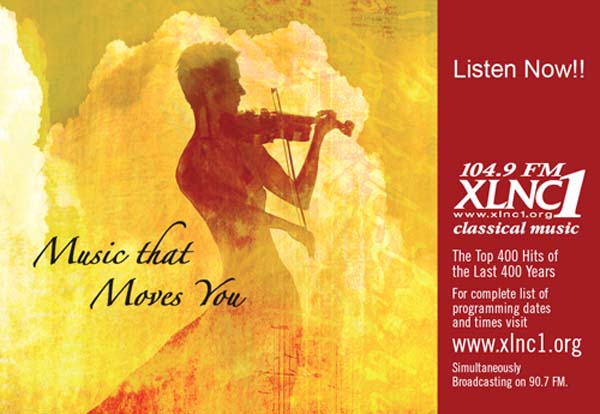

San Diego County Jewish Trivia Movies
Adapted from San Diego Trivia (1989) and San Diego Trivia 2 (1993)
{Editor’s Note: Retired librarian Evelyn Kooperman, a friend to the Jewish community, enjoys playing the cello and collecting trivia about her native city of San Diego. This column excerpts Jewish communal items from her two books, San Diego Trivia (1989) and San Diego Trivia 2 (1993). Readers should note that the information has not been updated since the books were published. Kooperman still has a limited supply of the two books, which cover the general San Diego community in all its aspects. Either of the two volumes sells for $5 and may be obtained by telephoning the author at (619) 461-6095.}
By Evelyn Kooperman
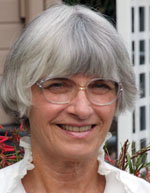 SAN DIEGO—Q1: In what 1991 movie starring Warren Beatty and Annette Bening were the Las Vegas scenes actually filmed in the Anza-Borrego Desert? SAN DIEGO—Q1: In what 1991 movie starring Warren Beatty and Annette Bening were the Las Vegas scenes actually filmed in the Anza-Borrego Desert?
Hint: In this fictionalized biography of a colorful gangster and “inventor” of Las Vegas, the Las Vegas airport scenes were shot at the tiny Ocotillo Wells Airport. A few miles outside of Ocotillo the sets of a posh Flamingo Hotel and casino were built, but unfortunately torn down right after the shooting. Other scenes were shot at Brown Field in Otay Mesa. San Diegan Annette Bening played Warren Beatty’s girlfriend. During filming an off-screen love affair developed, bringing one of Hollywood’s most eligible bachelors to the altar.
Q2: What star of the 1949 biblical movie Samson and Delilah moved to Rancho Santa Fe in 1957, living there until his death in 1999?
Please click here for answers


ADVENTURES IN SAN DIEGO JEWISH HISTORY
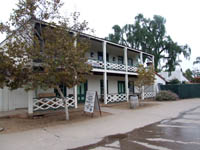
Robinson-Rose House
|
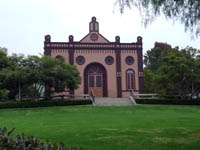
Old Temple Beth Israel |
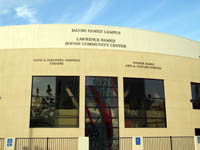
Lawrence Family JCC |
Editor's Note: We are reprinting news articles that appeared in back issues of various San Diego Jewish newspapers. You may access an index of the headlines of those articles by clicking here. You may also use the Google search program on our home page or on the headline index page to search for keywords or names.
Yo-Ma-Co
From Southwestern Jewish Press, June 19, 1947, page 6:
Another fine book review was presented this time by that eminent Harold Keen, highlighting an enjoyable evening at the last meeting. The well-known book “Thieves in the Night” dealt on terrorist activities in Palestine, and Harold made it highly interesting, clear in detail before an enthused gathering.
Talk of a much-needed Jewish Community Center for San Diego is being revived, so Phil Goldman and Art Friedlander will represent the club.
Plans are under way, for a club “weenie bake” to be held Saturday night, June 28th, at Mission Beach.
Election of officers as well as campaign speeches will dominate the meeting next Wednesday night, so plan to attend and vote for your favorite.
It was really good to see such an inspiring turnout Sunday of Yo-Ma-co’s especially the feminine sex root and cheer for their ever trying softball team.
All of us wish Sam Brenes a speedy recovery from his illness.
Birdie Stodel B.B.
From Southwestern Jewish Press, June 19, 1947, page 8
At our next regular meeting, a detailed report will be given by the returning delegates to the annual convention of District No. 4 B’nai B’rith Women which was held in Fresno beginning June 14th. Weare certain their report will be of vital interest to all members and stimulate enthusiasm and increased activity in furthering B’nai B’rith’s 8-point program.
We are happy to report that our president, Esther Schwartz took with her several overscriptions on some of our projects, particularly Child Rescue and at our last meeting a promise was made that all past presidents of Birdie Stodel will sponsor a party in the near future, the proceeds of which will go to Child Rescue.
Also in our effort to not only meet our subscription but to overscribe, we are following the example of other chapters and adopting an overseas family whom we will personally take under our wing and make their burden lighter by sending them packages of food, clothing and cheering letters. Sisters Ruth Brav and Edith Bennett are in charge of this special bit of work and have been contacting our members for support. For our first package, we are sending canned foods so to those members who will remember to bring several cans of food to our next meeting, it will make it possible for us to send our first package without much delay.
Also our own sister, Minnie Binnard will be quite happy for us to co-operate with her in child rescue work as she is chairmen of this project for the southern district.
Eli Levenson Elected to Executive Comm. of B’nai B’rith
From Southwestern Jewish Press, Thursday, June 26, 1947
San Diego comes to the fore in national B’nai B’rith activities with the election of Eli Levenson, prominent local attorney to the Executive Committee of the Grand Lodge, district No. 4 of B’nai B’rtih. The election of Grand Lodge officers and the Committee was a high point in the recent Convention held in Fresno.
A past president of Lasker Lodge B’nai B’rith, Mr. Levenson has long been active in many community projects, both Jewish and non-Jewish. At present he is the president of the United Jewish Fund of San Diego.
The Executive Committee which meets three times annually, generally in San Francisco, serves the District as an interim committee between Conventions. It guides the policies of B’nai B’rith and makes any procedure or law changes it deems advisable and beneficial for the continued success of the work.
Additional minor duties consist of visits to various Lodges in designated areas, and making decisions on any problems a Lodge might have. During the year, Mr. Levenson will make such visits to many neighboring Lodges, and undoubtedly discharge his duties with accuracy and acclaim.
Other Lasker Lodge members who attended the Convention as delegates were Morrie Douglas, president; Edward A. Breitbard, William B. Schwartz and Marshall Naiman. Jack Dembo was there in the capacity of Alternate, Delegate at Large was past Grand President Henry Weinberger and Morrie Kraus attended as a lay member.
Hearings to be Held on U.J.F. Allocations
From Southwestern Jewish Press, June 26, 1947, pages 1, 3
A full dress hearing on the disbursement of over $200,000 raised by the United Jewish Fund for distribution to overseas and national agencies will take place at the Temple Center, Third and Laurel, on Sunday, June 29, 10:00a.m. The Budget and Allocations Committee, under the Chairmanship of Victor Schulman, will be host to representatives of twelve organizations who are coming to San Diego to present their needs. Judge B.J. Scheinman, National Vice-chairman of the Joint Defense Appeal; Jack Danberg, Regional Director for the United Jewish Appeal; Harry M. Kaufman, Regional Director of HIAS; Zane Meckler, Pacific Coast Director of the Anti-discrimination Department of the Jewish Labor Committee; Dr. Samuel C. Kohs, Pacific Coast Secretary of the National Jewish Welfare Board, Samuel H. Golter, Executive Director of the Los Angeles Sanatorium; Dr. Isadore Rees of the American Jewish Congress; Irving Schneider, Treasurer and Morton J. Gaba, Regional Director of the Council of Jewish Federations and Welfare Funds; Sol Lewis, Field Representative of the Medical Center of the Hebrew University and Moshe Berman, Field Representative of the Palestine Histadruth Campaign will be in San Diego to speak for their organizations. Also speaking on behalf of organizations, will be several local community leaders who are members of the board of various national organizations. Victor Schulman declared that any member of the United Jewish Fund who wishes to speak on behalf of an organization would be welcome to do so but first must advise the United Jewish Fund Office so that that person may be included in the schedule of hearings.
The United Jewish Fund, in an answer to the appeal of Henry Morgenthau, Jr., National campaign Chair of the United Jewish Appeal, has forwarded an additional $25,000 to the Appeal, making a total of $75,000 from San Diego now being used for relief, rehabilitation and resettlement of Jews throughout the world.

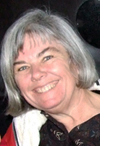 Nancy Harrison Nancy Harrison
cruise & tour specialist
(619) 265-0808

SAN DIEGO JEWISH TRIVIA ANSWERS 1) Bugsy (Siegel); 2) Victor Mature

SAN DIEGO JEWISH WORLD THE WEEK IN REVIEW
Middle East
Carnage again stalks Jerusalem's buses by Judy Lash Balint in Jerusalem
Victory in Iraq is well-worth fighting for by Shoshana Bryen in Washington, D.C.
Biking can make you and planet more fit by Ulla Hadar in Kibbutz Ruhama, Israel
United States of America
American Jewish civics quiz for July 4 by Sheila Orysiek in San Diego
San Diego
Confronting abuse in the Jewish community by Rabbi Jeff Brown in Cardiff by the Sea, California
Adventures in San Diego Jewish History
—June 19, 1947: Hashomer Hatzair to Have Summer Camp
—June 19, 1947: Program Completed for Day Camp
—June 19, 1947: Jewish War Vets
Arts
Thursdays with the songs of Hal Wingard
—#247, Dieting
—# 308, Great New Diet
—# 74, Bad Booze Blues
Middle East
'Standupistim'—That's Hebrew for 'Stand Up comics'—wow 'em in Israel by Judy Lash Balint in Jerusalem
Only in Israel? A Tale of Four Chickens by Dorothea Shefer-Vanson in Mevasseret Zion, Israel
Australia
The Jews Down Under, Jewish news of Australia and New Zealand by Garry Fabian
Progessive view on Rabbi Jonathan Sacks ... Historic agreement on emergency management ...Graeme Samuel explains silence on Pratt case ... Being 'green' is the Jewish thing to do .. Salary hikes impact on Jewish school ... New Zealand's Jewish Community doubly celebrates ...
Australia -Israel link on celluloid...Antisemitism after the Holocaust
San Diego
The 20-gallon challenge; can you save water each day, help preserve Earth's resources? by Donald H. Harrison in San Diego
Adventures in San Diego Jewish History
—June 19, 1947: U.J.F. Campaign Continues
—June 19, 1947: Newcomers to Country Welcome Baby Boy
—June 19, 1947: Francis W. Parker School Packs 20 Boxes for S.O.S.
—June 19, 1947: Temple Sisterhood Sponsor New Project
Lifestyles
When the extended family met at the grandparents' house in Newark, N.J. by Gail Feinstein Forman in Newark, N.J.
Middle East
Israel's painful deal with Hizbollah by Ira Sharkansky in Jerusalem
What the devil is O.C.S.? or how to end importing Middle East oil by J. Zel Lurie in Delray Beach, Florida
Canada
In aftermath of Golubchuk case, Canada grapples with when a patient is dead by Rabbi Dow Marmur in Toronto, Canada
San Diego
San Diego Mesa College librarian Jack Forman a connoisseur of Jewish books by Donald H. Harrison in San Diego
Adventures in San Diego Jewish History
—Honor Your Loved Ones On-line
—June 12, 1947: Pioneer Women
—June 12, 1947: Birdie Stodel B.B.
—June 12, 1947: J.C.S.C.
—June 12, 1947: Gerald Schissell Elected To Office
Lifestyles
Pop proudly gives a tour of his 'palace' by Gail Feinstein Forman in San Diego
Middle East
Sarkozy should butt out of Israel's affairs by Isaac Yetiv in La Jolla, California
Judaism
Midbar kvetching:complaints in the desert by Sheila Orysiek in San Diego
Adventures in San Diego Jewish History
—Honor Your Loved Ones On-line
—June 12, 1947: U.J.F. Announces Close of Campaign
—June 12, 1947: Telegram from Henry Morgenthau Jr. to Albert Hutler
—June 12, 1947: Admiral Badger Accepts Placque (sic)
The Arts
Cast of Morgan-Wixson's Cabaret weak by Cynthia Citron in Santa Monica, California
Lifestyles
Dancing their way through the senior years by Donald H. Harrison in Oceanside, California
Menus come on parchment in Dussini Mediterranean Bistro in the Gaslamp by Lynne Thrope in San Diego
Europe
Politics in jolly and not-so-jolly England by Lloyd Levy in Henley-on-Thames, England
Judaism
Why the soldier decided to wear his kippah by Rabbi Baruch Lederman in San Diego
The qualifications for being 'a good Jew' by Rabbi Leonard Rosenthal in San Diego
Adventures in San Diego Jewish History
Remember Your Loved Ones On-line
—May 29, 1947: Letter to the Editor {From Mike Lustig}
—May 29, 1947: We Were There by Albert Hutler
—May 29, 1947: Beth Jacob Congregation
The Arts
Golden Boy: New Village Art's golden oldie by Carol Davis in Carlsbad, California
A lesson in being true to one's real self by Donald H. Harrison in San Diego
Sports
A bissel sports trivia with Bruce Lowitt in Clearwater, Florida
)
Middle East
Parallels of German, Iraqi reconstructions by Shoshana Bryen in Washington D. C.
High school art project; Sderot twins illustrate Kassams' psychological impact by Ulla Hadar in Sderot, Israel
Lifestyles
Father and daughter both made some new friends on Single Parent Family Weekend by Gary Rotto in Angelus Oaks, California
San Diego County
Astronaut, centenarian address San Diego conference on aging and independence by Gerry Greber in San Diego
San Diego Jewish Trivia: Music by Evelyn Kooperman in San Diego
Adventures in San Diego Jewish History
Remember Your Loved Ones On-line
—May 22, 1947: Pioneer Women by Bess Borushek
—May 22, 1947: Eli Levenson Praises Chairmen In Making Final Welfare Fund Appeal
—May 22, 1947: Hillel Councilorship at State College a Possibility
The Arts
Chapter 14 of Reluctant Martyr, a serialized novel by Sheila Orysiek of San Diego
Link to previous editions
< BACK TO TOP
|
